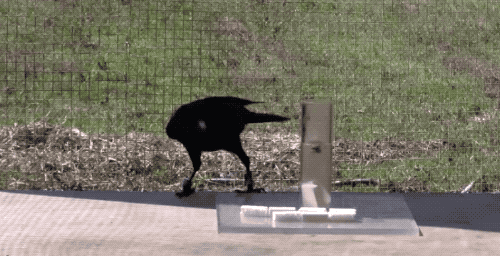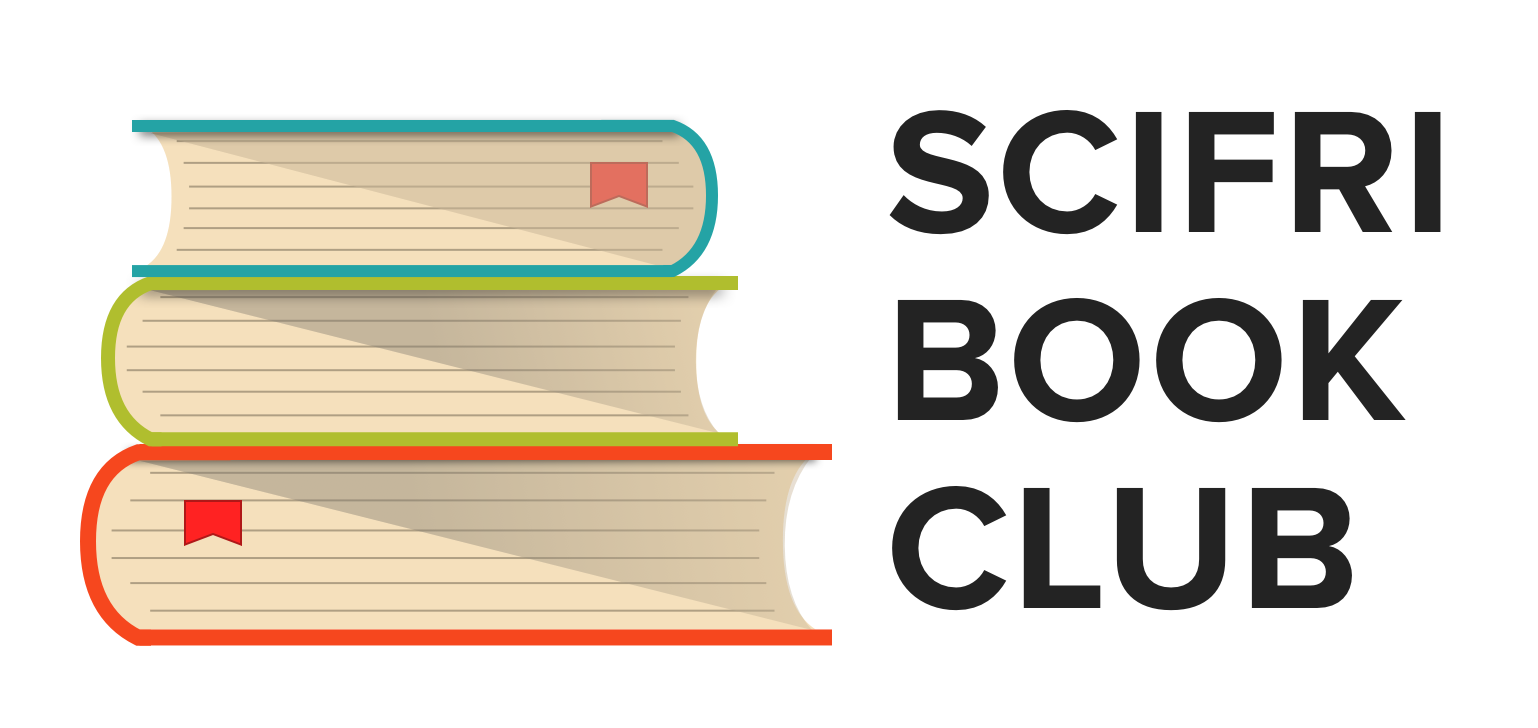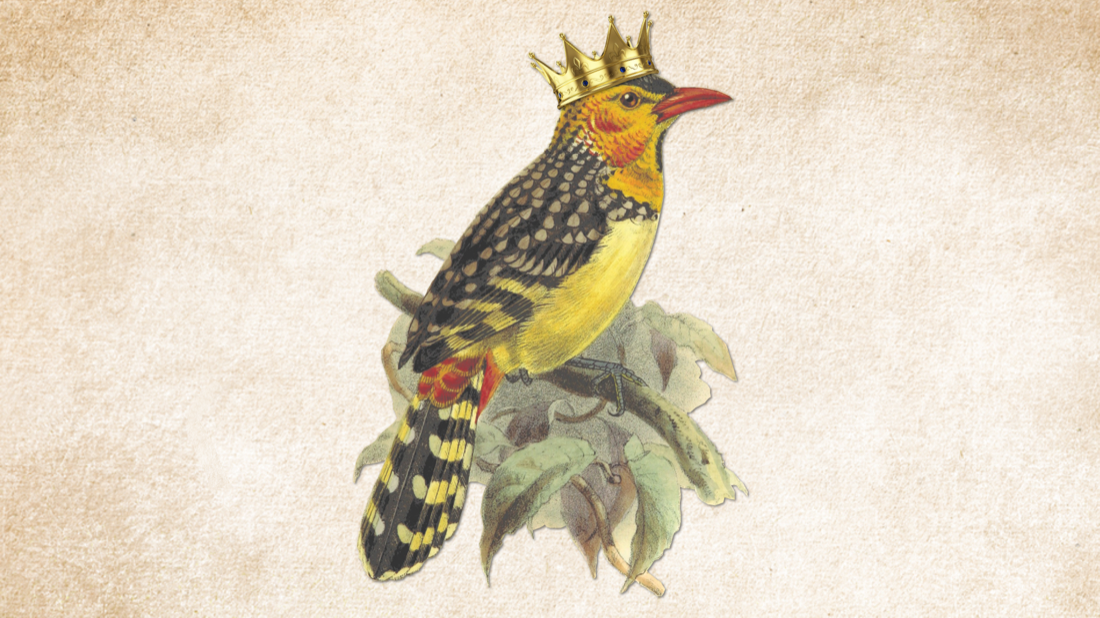Read ‘The Genius Of Birds’ With The SciFri Book Club!
11:57 minutes

 This story is part of our summer Book Club conversation about Jennifer Ackerman’s book ‘The Genius of Birds.’ Want to participate? Sign up for our newsletter or send us your thoughts on the SciFri VoxPop app.
This story is part of our summer Book Club conversation about Jennifer Ackerman’s book ‘The Genius of Birds.’ Want to participate? Sign up for our newsletter or send us your thoughts on the SciFri VoxPop app.
Called anyone a “bird brain” recently? There was a time when we thought this meant “stupid,” deceived by the small size and smooth surface of birds’ brains into thinking they were mere mindless bundles of feathers.
But researchers are finding out what birds themselves have always known: Our feathered friends come with mental skills that might stump even humans. Be it tool-making, social smarts, navigation across vast distances, or even the infinitely adaptable house sparrow, Jennifer Ackerman writes of dozens of examples in this summer’s SciFri Book Club pick, The Genius of Birds. Take homing pigeons, which can be released hundreds of miles from the roof and still eventually wing their way home. Or mockingbirds, who can memorize and mimic, with astonishing accuracy, the songs and calls of as many as 200 different other birds. And birds have other kinds of genius: Bowerbirds craft intricate displays to lure their mates, each species with its own particular aesthetic preferences, like the satin bowerbird’s penchant for blue.
Ira, Book Club captain Christie Taylor, and bird brain researchers Aaron Blaisdell and Lauren Riters convene for the summer Book Club kickoff, and a celebration of avian minds everywhere.
 Calling All Bird Brains!
Calling All Bird Brains!We hope you’ll join us for Egghead: The Genius of Birds on August 29 in NYC! The Science Friday Book Club invites you to an indoor birding adventure, where we’ll explore the lives and minds of our fowl friends. Learn more and buy tickets here.
Christie Taylor was a producer for Science Friday. Her days involved diligent research, too many phone calls for an introvert, and asking scientists if they have any audio of that narwhal heartbeat.
Lauren Riters is a professor of integrative biology at the University of Wisconsin-Madison.
Aaron Blaisdell is a professor of comparative psychology at the University of California, Los Angeles.
IRA FLATOW: A hot and steamy weekend is in store for a lot of folks. Perhaps a time to escape the sweltering city, head to the beach, or seek refuge in, oh, a shady hammock. That sounds so good. If that’s on your agenda, and if you were looking for something to read while on the road or in that hammock, we have one particular recommendation for you that might seem for the birds. It’s this summer’s sci-fi book club selection, Jennifer Ackman’s The Genius of Birds, tackling the myths about bird brains, celebrating some of the incredibly clever things our feathered friends can do.
And we want you to join us. Sci-fi producer and bookworm Christie Taylor is here to tell you how to play along. Hi, Christie.
CHRISTIE TAYLOR: Hey, Ira. How’s it going?
IRA FLATOW: It’s summer vacation season. I am about to scram myself for the weekend.
CHRISTIE TAYLOR: I’m jealous.
IRA FLATOW: So excited to have time to read for fun. So tell us more about The Genius of Birds.
CHRISTIE TAYLOR: Right, so The Genius of Birds by Jennifer Ackerman, as you said, it is nonfiction, as we do every summer. But it is this delightfully poetic, super engrossing look at this old stereotype about birds not being very smart.
IRA FLATOW: OK, now, the term birdbrain, for example, describes a stupid or a foolish person. I take it that phrase is gone goose these days.
CHRISTIE TAYLOR: Yeah, right. There was this time– I love birds. I think they’re smart. I don’t see it myself.
But there was a time about 100 years ago when people thought bird brains were too tiny to harbor intelligence. They had sacrificed everything, including smarts, in order to be light enough to fly. But researchers in more recent decades have been subjecting birds to all kinds of IQ tests. And the verdict is that many species are doing things you or I could never in a million years wrap our heads around.
IRA FLATOW: I know. I can’t migrate thousands of miles along the same route every year, even with my GPS app. And I love hummingbirds. And I’m so impressed how hummingbirds keep coming back to the same spots year after year.
CHRISTIE TAYLOR: Yeah. And I’m a huge pigeon fan. And I still can’t really believe how homing pigeons, you can put them in a truck, drive them 100 miles from home, and they will find their way back to the roost.
You’ve seen those videos of crows solving puzzles on the internet, or even making little tools to get food. If you look at mockingbirds, they can memorize and mimic as many as 200 calls and songs from other birds, not just even in their own language. So in this book, Jennifer Ackerman is taking us around the world.
She goes to Australia, South America, even back to sort of common house sparrows in cities to introduce us to these birds and the different way scientists are studying their brains. I would maybe call this book not quite a beach read for summer. But for people who are spending time in the woods, you can look for shore birds, or even just in your own backyard, right? There is something to love.
IRA FLATOW: You sold it to me. How do we get involved?
CHRISTIE TAYLOR: All right, so I have a laundry list for you.
IRA FLATOW: Go for it.
CHRISTIE TAYLOR: First of all, as we do every year, we’re giving away 20 free copies of the book this weekend, thanks to our friends at Powell’s books. You can go to ScienceFriday.com/bookclub for that and information about everything else I’m about to talk about. We will also be sending weekly newsletters with discussion questions and having conversations with our listeners in our Facebook group.
And we’re asking you to share your thoughts in our new app, SciFri VoxPop. You can join the conversation by searching for sci-fi vox pop. That’s a V as in victory, O-X-P-O-P to send basically your voice comment, just like you’re calling us on the phone, wherever you get your apps.
And then for NYC listeners, we have a live event in August to look forward to. We’re already selling tickets. And Ira, as you know, the early bird gets the bookworm.
IRA FLATOW: Oh, that’s something I would have said. And all of this is up on our web page. It’s ScienceFriday.com/bookclub.
CHRISTIE TAYLOR: Right. And all month, we’ll be celebrating bird genius in different ways on the air and online. And we’ll wrap up with a big conversation with two bird brain researchers at the end of August.
IRA FLATOW: OK, so how do you test a bird’s IQ anyway if they can’t talk?
CHRISTIE TAYLOR: Right, they can’t tell us what they think the answer to a question is, right? I want to bring on those two experts, actually, right now to talk about that a bit since they’re both deep in the work of trying to see what’s going on inside a bird’s head. So welcome to Dr. Lauren Riters. She’s a Professor of Integrative Biology and Neuroscience at the University of Wisconsin. Hey, Lauren.
LAUREN RITERS: Hey there.
CHRISTIE TAYLOR: Hey. And Dr. Aaron Blaisdell, Professor of Psychology and head of the Comparative Cognition Lab at UCLA. Welcome, Aaron.
AARON BLAISDELL: Thanks for having me on the show.
CHRISTIE TAYLOR: Yeah. Welcome, both of you. So Lauren, like I said before, I don’t really think of birds as dumb. But that bird brain stereotype came from somewhere, right?
LAUREN RITERS: That’s right. Yeah, so there are a few reasons that birds were considered to be bird brained. And I think Jennifer Ackerman does a really great job of introducing this. And you already mentioned that there’s this early idea that having feathers is not compatible with intelligence. So there was this idea that there’s a trade-off between flight and brain power, and that birds had to give up big, complex brains so that they could fly.
And when scientists looked at bird brains, they saw that they were different from mammals. They’re really smooth. And in mammals, they’re wrinkled and convoluted. And in mammals, you see neurons in areas of the brain that are important for higher level thinking.
But they’re organized in distinct layers. And you just don’t see that in birds. And so these differences were taken to suggest that the bird brain is just not set up to produce exceptional, complex behaviors. And then, it didn’t help that when scientists were naming the brain areas in birds, they called them things like, one example is paleostriatum primitivum, which reflected the idea– at the time anyway– that the bird brain is ancient and primitive and not highly evolved.
CHRISTIE TAYLOR: Mm-hmm. But Aaron, on the other hand, we have all of these examples of birds actually being quite smart, or at least remarkable in their thinking.
AARON BLAISDELL: That’s right. A lot of the examples that Jennifer Ackerman covers in her book actually come from all the cutting edge research that’s been going on over the past couple of decades. With some examples being Professor Irene Pepperberg’s famous parrot, [INAUDIBLE] Alex, who she taught human language. And we know that parrots have for a long time been known to learn languages. But she was able to teach it a lot of English words. And then, using those words, was able to interrogate the intelligence of Alex and really uncovered a profound intelligence with lots of human-like qualities.
And just another example is finding out that– so back in the ’60s when people thought only humans used tools, it was Jane Goodall who discovered that chimpanzees also used tools. And that was a groundbreaking discovery. Well, flash forward to just the past few decades. And we’ve discovered that many birds, especially the New Caledonian crows, are so amazingly proficient at tool use.
CHRISTIE TAYLOR: Yeah. And Aaron, you’re studying pigeons more specifically. Are they using tools, or what are they up to?
AARON BLAISDELL: The pigeons are not known for being tool users, although we are really good at getting them to peck at buttons and keys and things like that. But the kind of work I study about pigeons is more about, what kind of psychological processes do they have that are similar to what’s found in mammals, in particular like humans? So what kind of memory processes, what kind of learning processes do they have? And also, what kind of higher level cognition do they show in terms of reasoning processes and abstract levels of cognition?
IRA FLATOW: I’m Ira Flatow with Christie Taylor and Science Friday from WNYC Studios.
CHRISTIE TAYLOR: Yeah, and Lauren, you’re working with starlings. But you’re asking a different set of questions, right?
LAUREN RITERS: Yeah, that’s right. So I actually began studying birds by also studying pigeons. I was studying homing pigeons and how they return from distant locations.
CHRISTIE TAYLOR: Team pigeon.
LAUREN RITERS: That’s right. But then I discovered songbirds. And so for about 20 years, I’ve been studying birdsong. And a lot of my research is focused on what I refer to as why birds sing. So I’m interested in what motivates birds to sing, what rewards singing behavior.
And in some cases, this is clear. So males will commonly sing to attract mates. And this can result in made attraction. And the male will mate, and that will reward his singing behavior immediately.
But sometimes we don’t know why birds are singing. So for example, often outside the breeding season, birds will form flocks. For example, when they’re preparing to migrate. Or they’ll form these large over wintering flocks. And they’ll sing at really high rates. And we don’t know why.
It’s important for them to sing because they have to learn their songs. Songbirds learn songs from adult tutors so they need to practice. And forming flocks and singing in the flocks is probably– the song keeps the flock together.
But at this time, they’re not attracting a mate. They’re not repelling rivals. They’re just singing. And so Darwin actually proposed that in this context, in these large, affiliate flocks, birds are singing for their own amusement. And so research from my lab is now supporting this idea. We’re finding that birds in some contexts do appear to sing because it’s intrinsically rewarding. So basically, we’re finding–
CHRISTIE TAYLOR: So they’re having fun.
LAUREN RITERS: Yeah, they sing for fun.
CHRISTIE TAYLOR: That’s amazing. So how do we know any of the things that we know though? These animals can’t talk to us, as Ira just asked earlier. We can’t just ask them what they’re thinking or feeling. So what are your experiments like? How do you tap into what’s going on in that head of theirs?
LAUREN RITERS: OK, so it is difficult to probe the internal cognitive or emotional state of birds. And there are many methods. And some of them are described really well in Jennifer Ackerman’s book.
But with respect to my own research, for years we’ve been trying to figure out how to ask a bird if it feels good to sing. And so what we’ve come up with is something that we borrowed from studies that are often run in psychology departments to look at reward associated with drugs of abuse.
So these are rat studies. And they use what’s called a conditioned place preference test of reward. And so I’m going to skip details here.
But basically, you give a rat heroin, which is an opioid. And we think that actually when birds are singing and it’s rewarding, this has to do with endogenous opioid release. So I picked heroin as an example here.
But if you give a rat heroin in a particular place, like a chamber that’s decorated with polka dots, then later if you give the rat a choice between a chamber decorated with polka dots or one that’s decorated with stripes, the rat is going to spend most of its time in the polka dot chamber. So it develops a preference for a place associated with that positive heroin experience.
So this means that heroin is rewarding, right? People accept that. And so what we’ve been doing in our studies is, instead of pairing heroin with a distinct place, we pair singing behavior. So the act of singing, birds are producing song. And we pair that with a distinctive place. And then what we find is that songbirds will develop strong preferences for places that were associated with singing behavior–
IRA FLATOW: All right. We–
LAUREN RITERS: –so specifically.
IRA FLATOW: I have to thank Christie and our guests.
CHRISTIE TAYLOR: Yeah, so thank you both for joining us. We’re going to talk a lot more with both of you when we wrap up at the end of August. But again, thanks to Lauren Riters, Professor of Integrative Biology at the University of Wisconsin, and Aaron Blaisdell, Professor of Psychology at UCLA.
IRA FLATOW: And of course, Christie is our librarian of the book club. And everything you need to know to play along and join the drawings for a free book– free book– on our website at ScienceFriday.com/bookclub. Thank you, Christie for shepherding our club today.
Charles Bergquist is our director. Senior producer, Christopher Intagliata. Our producers are Alexa Lim, Christie Taylor, Katie feather. Our intern is Camille Petersen. B.J Leiderman composed our theme music.
And we had technical and engineering help today from Rich Kim, Kevin Wolfe, and Sarah Fishman, who is working the boards for us here for the last time. Sarah, we loved having you all these years with us. And we wish you very well in your new adventure. Hope you’ll check in every once in a while. I’d like to know what’s going on.
And of course, we’re active all week on Facebook, Twitter, Instagram, all social media. If you have a smart speaker, you can ask it to play Science Friday whenever you want. So sort of everyday now is Science Friday. I’m Ira Flatow in New York.
Copyright © 2019 Science Friday Initiative. All rights reserved. Science Friday transcripts are produced on a tight deadline by 3Play Media. Fidelity to the original aired/published audio or video file might vary, and text might be updated or amended in the future. For the authoritative record of Science Friday’s programming, please visit the original aired/published recording. For terms of use and more information, visit our policies pages at http://www.sciencefriday.com/about/policies/
Christie Taylor was a producer for Science Friday. Her days involved diligent research, too many phone calls for an introvert, and asking scientists if they have any audio of that narwhal heartbeat.
Johanna Mayer is a podcast producer and hosted Science Diction from Science Friday. When she’s not working, she’s probably baking a fruit pie. Cherry’s her specialty, but she whips up a mean rhubarb streusel as well.
Ira Flatow is the founder and host of Science Friday. His green thumb has revived many an office plant at death’s door.